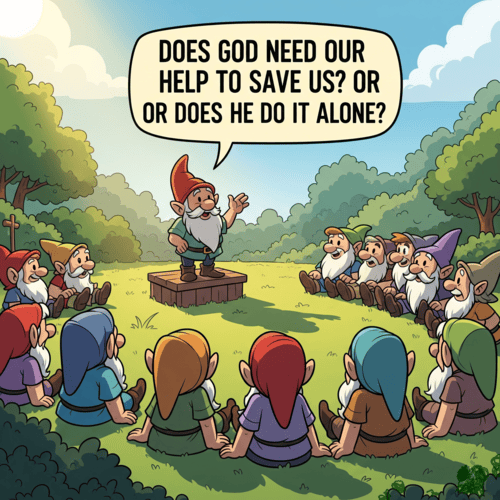Monergism vs Synergism: Is Salvation God’s Work Alone?
When God saves us, does He do it alone, or does He need our help? The question isn’t mere theological hairsplitting. How we answer it shapes everything—our assurance of salvation, our understanding of grace, and our relationship with God Himself.
The debate has a name: monergism vs synergism. Monergism (from Greek mono = one and ergon = work) teaches God alone works in salvation. Synergism, on the other hand, teaches we cooperate with God—that we must contribute something to our own salvation. Which of the two does Scripture affirm?
THE PROBLEM: WE’RE SPIRITUALLY DEAD
Before we can grasp how God saves, we need to realise our condition without Him. The Bible doesn’t describe unsaved people as merely sick or wounded—it says we’re dead.
Paul writes, “And you were dead in the trespasses and sins in which you once walked” (Ephesians 2:1). This isn’t metaphorical death. Spiritually speaking, we’re as lifeless as a corpse. What can dead people do? Nothing. They can’t hear, respond, or contribute. If you’re dead, you need someone else to make you alive.
The apostle continues the grim diagnosis: “The natural person does not accept the things of the Spirit of God, for they are folly to him, and he is not able to understand them because they are spiritually discerned” (1 Corinthians 2:14).
Notice that word: “not able.” This isn’t about unwillingness—it’s about inability. We’re not just reluctant to come to God; we’re incapable of it. Paul drives the point home even further in Romans: “None is righteous, no, not one; no one understands; no one seeks for God” (Romans 3:10-11). If no one seeks God, then anyone who does find Him must have been sought first.
THE BONDAGE OF THE WILL
“But wait,” someone might object, “don’t we have free will? Can’t we choose God if we want to?” Here’s the issue: our will is free, but it’s enslaved to our nature. And our nature is corrupted by sin.
Jesus explained it this way: “Truly, truly, I say to you, everyone who practices sin is a slave to sin” (John 8:34). Slaves don’t choose their master’s will—they’re bound to it.
Paul confirms this: “For the mind that is set on the flesh is hostile to God, for it does not submit to God’s law; indeed, it cannot. Those who are in the flesh cannot please God” (Romans 8:7-8).
Cannot. Not “will not”—cannot. The unregenerate mind is hostile to God and incapable of pleasing Him. This includes the act of faith itself. If we’re dead in sin and enslaved to rebellion, we cannot contribute to our salvation. We need God to act unilaterally—to work alone.
THE NEW BIRTH: GOD’S EXCLUSIVE WORK
This is where monergism shines. The Bible describes salvation as being “born again”—and birth is something that happens to us, not something we do. Jesus told Nicodemus, “Unless one is born again he cannot see the kingdom of God” (John 3:3). When Nicodemus asked how this could be, Jesus explained, “The wind blows where it wishes, and you hear its sound, but you do not know where it comes from or where it goes. So it is with everyone who is born of the Spirit” (John 3:8).
The Spirit works sovereignly, like wind that blows where it chooses. We don’t control it; we’re moved by it. “But to all who did receive him, who believed in his name, he gave the right to become children of God, who were born, not of blood nor of the will of the flesh nor of the will of man, but of God” (John 1:12-13).
Not of the will of man—but of God. Our new birth isn’t the result of human decision; it’s God’s sovereign work. The prophet Ezekiel provides the beautiful picture: “And I will give you a new heart, and a new spirit I will put within you. And I will remove the heart of stone from your flesh and give you a heart of flesh” (Ezekiel 36:26). Notice the active verbs: “I will give,” “I will put,” “I will remove.” God doesn’t ask our permission or wait for our cooperation. He acts decisively to transform us.
THE CALL THAT CANNOT FAIL
But how does this work practically? It works through what theologians call “effectual calling”—God’s irresistible call that always accomplishes its purpose. Jesus said, “All that the Father gives me will come to me” (John 6:37). Not “might come” or “could come”—will come. The Father’s gift to the Son isn’t lost in transit. It’s certain to arrive.
Later, Jesus explained: “My sheep hear my voice, and I know them, and they follow me” (John 10:27). His sheep don’t just hear—they follow. The call produces the response.
Paul traces this golden chain: “And those whom he predestined he also called, and those whom he called he also justified, and those whom he justified he also glorified” (Romans 8:30). Every person predestined is called; every person called is justified. No one falls through the cracks.
Luke records a beautiful example: “And when the Gentiles heard this, they began rejoicing and glorifying the word of the Lord, and as many as were appointed to eternal life believed” (Acts 13:48). As many as were appointed—believed. The appointment made belief certain.
FAITH ITSELF IS GOD’S GIFT
“But surely,” someone might argue, “we at least contribute our faith? Don’t we have to believe?” Yes, we must believe. But even faith is God’s gift, not our contribution. Paul is explicit: “For by grace you have been saved through faith. And this is not your own doing; it is the gift of God, not a result of works, so that no one may boast” (Ephesians 2:8-9).
The grammar makes clear that the entire salvation—including the faith by which we receive it—is God’s gift. If we contributed even our faith, we’d have grounds for boasting. Paul tells the Philippians, “For it has been granted to you that for the sake of Christ you should not only suffer for his sake but also believe in him” (Philippians 1:29). Belief is granted—given as a gift.
Peter writes to believers about “a faith of equal standing with ours by the righteousness of our God and Saviour Jesus Christ” (2 Peter 1:1). They had “obtained” this faith—received it as a gift. Even the source of faith confirms this: “So faith comes from hearing, and hearing through the word of Christ” (Romans 10:17). Faith isn’t generated from within us; it comes from outside through God’s Word.
WHY MONERGISM MATTERS
Understanding that salvation is God’s work alone has profound practical implications.
- It humbles us completely. Paul writes, “So that no human being might boast in the presence of God” (1 Corinthians 1:29). Monergism strips away all boasting and puts the glory where it belongs: with God alone.
- It provides unshakeable assurance. If our salvation depended partly on us, we could never be certain of it. Our performance varies; our faith fluctuates. But if God has begun the work, He will complete it: “And I am sure of this, that he who began a good work in you will bring it to completion at the day of Jesus Christ” (Philippians 1:6).
- It motivates evangelism. Far from discouraging outreach, monergism encourages it. Our job isn’t to convince the unwilling but to proclaim the truth, trusting the Spirit to open hearts.
- It magnifies grace. When we understand that God saves completely—that every aspect of salvation flows from His grace—we’re overwhelmed with gratitude. We love much because we’ve been forgiven much.
THE BEAUTY OF GOD’S EXCLUSIVE WORK
Monergism isn’t just theologically correct; it’s beautiful. It means salvation is entirely secure, completely gracious, and utterly certain. When God sets His love on someone, nothing can stop it. Not human inability, not Satanic opposition, not even our own sin. His love pursues, captures, and transforms. His grace is truly irresistible.
This is the gospel: God saves sinners completely, without their help, through the work of His Son and the power of His Spirit. We contribute nothing but the sin that made salvation necessary. He provides everything—the perfect sacrifice, the new birth, the gift of faith, the assurance of perseverance.
The apostle Paul understood this. After describing the golden chain of salvation in Romans 8, he breaks into worship: “What then shall we say to these things? If God is for us, who can be against us? He who did not spare his own Son but gave him up for us all, how will he not also with him graciously give us all things?” (Romans 8:31-32). Salvation is God’s work alone, and that makes all the difference.
MONERGISM VS SYNERGISM: RELATED FAQs
Doesn’t monergism reduce us to mere robots by eliminating genuine human choice? No, monergism doesn’t eliminate human choice—it transforms it. As RC Sproul explained, we always act according to our strongest desire at any given moment. Before regeneration, our strongest desire is always away from God; after regeneration, God gives us new desires that lead us toward Him. We act freely according to our nature, but God graciously changes our nature.
- If salvation is entirely God’s work, why do some people seem to “lose their salvation”? This touches on the doctrine of perseverance of the saints. John MacArthur teaches that those who appear to lose salvation likely never possessed it—they experienced temporary faith but not regeneration. MacArthur became a five-point Calvinist around 1997, emphasising God’s electing grace ensures perseverance. True faith, being God’s gift, cannot ultimately fail because it’s sustained by God’s power, not human effort.
- What’s the difference between monergism and hyper-Calvinism? Hyper-Calvinism concludes that since God sovereignly elects, we don’t need to evangelise or call sinners to faith. True monergism, as taught by scholars like James White, affirms both God’s sovereignty and human responsibility. White has debated extensively on monergism versus synergism, emphasising God’s sovereignty doesn’t eliminate our duty to preach—it guarantees its success with the elect.
- How do we interpret passages that seem to teach synergism, like “work out your salvation with fear and trembling”? Contemporary Reformed theologians point to the next verse: “for it is God who works in you, both to will and to work for his good pleasure” (Philippians 2:13). We “work out” what God “works in.” RC Sproul taught sanctification involves human effort, but this effort is itself the fruit of God’s prior regenerating work. The capacity for spiritual work is God’s gift, not human contribution.
Can someone be a genuine Christian while holding to synergism? Most Reformed scholars distinguish between the gospel one believes and the theology one holds. John MacArthur and others acknowledge that many genuine Christians hold synergistic views due to incomplete understanding, not rejection of grace. However, they argue synergism, when consistently applied, undermines assurance and shifts glory from God to man. Doctrinal precision serves pastoral health.
MONERGISM VS SYNERGISM: OUR RELATED POSTS
Editor's Pick

The Nashville Statement: Why Affirm It Despite Media Backlash?
WHY DO REFORMED CHRISTIANS STAND BY THIS STATEMENT ON MARRIAGE AND GENDER? When the Nashville Statement was released in 2017, [...]

Who Is Belial? Solving The 2 Corinthians 6:15 Mystery
Belial: This name from the pages of Scripture chills the soul. Who is this mysterious figure Paul invokes in 2 [...]

Celibacy Or Castration: What Jesus Really Means in Matthew 19:12
One of Scripture's most shocking misinterpretations led theologian Origen to castrate himself in the third century. His tragic mistake? Taking [...]

Philippians 4:13: Did Paul Really Mean We Can Do ALL Things?
"I can do all things through Christ who strengthens me." It's on gym walls, graduation cards, and motivational posters everywhere. [...]

The Ordinary Means of Grace: Why Are They Indispensable?
ORDINARY MEANS FOR EXTRAORDINARY TRANSFORMATION What if God's most powerful work in believers' lives happens through the most ordinary activities? [...]

Is the Bible God’s Word? Or Does It Only Contain God’s Word?
The authority of Scripture stands at the crossroads of modern Christianity. While some argue the Bible merely contains God’s Word [...]

Will We Remember This Life in Heaven? What Isaiah 65:17 Means
"Will I remember my spouse in heaven? My children? Will the joy we shared on earth matter in eternity?" These [...]

From Empty to Overflow: The Abundant Life Jesus Promised
(AND WHY YOU SHOULDN’T SETTLE FOR LESS) We're surviving, but are we thriving? If we're honest, there's a gap between [...]

What Does Jesus Save Us From?
THREE BIBLE TRUTHS ABOUT SALVATION "Jesus saves." We’ve seen it on bumper stickers, heard it shouted at sporting events, maybe [...]

If God Wants Everyone Saved, Why Aren’t They?
THE REFORMED VIEW ON GOD’S DESIRE VS HIS DECREE The question haunts every believer who has lost an unbelieving loved [...]
SUPPORT US:
Feel the Holy Spirit's gentle nudge to partner with us?
Donate Online:
Account Name: TRUTHS TO DIE FOR FOUNDATION
Account Number: 10243565459
Bank IFSC: IDFB0043391
Bank Name: IDFC FIRST BANK






